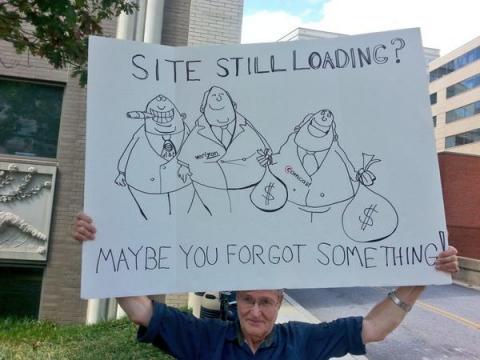FCC gets another Net Neutrality protest
On the 16th of September, net neutrality protesters returned to the headquarters of the FCC, where chairman Tom Wheeler is pushing a plan to allow "paid prioritization" of content from websites willing to pay internet service providers for premium access. This "internet fast lanes" plan would allow your phone or cable company to slow your access to videos from this site so that Facebook and Netflix would load faster, and could lead to the removal of most independent websites from the Internet if nobody can reach them. After all, the bandwidth has to come from somewhere.
In all of the protests this year at the FCC, activists have been demanding that all internet service providers be reclassifed as common carriers rather than as "information services." A common carrier is not permitted to discriminate on the basis of content, the historical example being voice phone service. It is actually illegal for a phone company to terminate calls containing words they don't like or to charge people extra for calling undesired numbers in the same calling area. Net neutrality activists want the same protection when the same phone company or a Cable TV company competing with them is carrying digital data instead of voice communications over their lines.
The DC rally was not the only one, there was also a net neutrality rally in Philiadephia in front of Comcast's headquarters. Although Comcast runs ads claiming to support net neutrality, one of the initial triggers of the debate was attempts by Comcast to block Bitorrent, seen as competing with cable TV service as a provider of movies. Comcast, like all cable TV companies, does not want people who watch paid content to get it over the Internet instead of from them. The situation with mobile (cellular) internet providers is even worse, with some carriers already exempting paying sites like Instagram from bandwidth caps, then offering very low priced discount plans with tiny monthly data caps that exempt these sites. Over time, the spread of that sort of plan will mean that uncensored Internet access becomes available only to the rich and the middle class.



